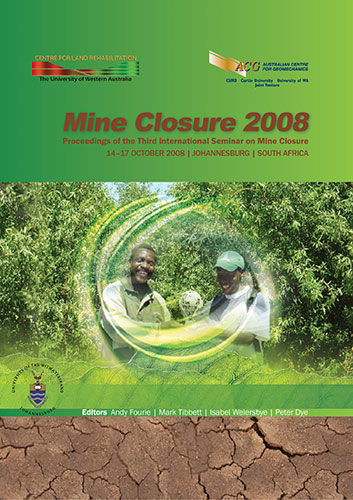Suitability Analysis for Post-Closure Land Management Options Using a Multi-Stakeholder Decision Support Tool

|
Authors: Soltanmohammadi, H; Osanloo, M; Sami, A Paper is not available for download Contact Us |
DOI https://doi.org/10.36487/ACG_repo/852_31
Cite As:
Soltanmohammadi, H, Osanloo, M & Sami, A 2008, 'Suitability Analysis for Post-Closure Land Management Options Using a Multi-Stakeholder Decision Support Tool', in AB Fourie, M Tibbett, I Weiersbye & P Dye (eds), Mine Closure 2008: Proceedings of the Third International Seminar on Mine Closure, Australian Centre for Geomechanics, Perth, pp. 335-346, https://doi.org/10.36487/ACG_repo/852_31
Abstract:
The decision making process leading to potentially contentious mine closure management options being adopted necessitates a collaborative procedure, where all concerned stakeholders participate in arriving at the final decision. This process needs to take into account different and sometimes conflicting attributes of the damaged ecosystem. In this study, application of a Group Decision Making (GDM) approach, which takes into account judgments by all the identified stakeholders in a comprehensible mathematical model, is illustrated through a hypothetical example of a mine closure planning process. For this purpose, fourteen technical and stakeholder-related attributes which influence evaluation in decision making were identified and divided into criteria groups in a hierarchical structure. This hierarchy can then be sent to the stakeholder groups to score both performance and importance of the attributes. A group version of Technique for Order Preference by Similarity to Ideal Solution (TOPSIS), which is a distance-based Multi- Attribute Decision-Making (MADM) technique, is used to rank the management options. Application of the proposed approach to the mined ecosystem example generates consensual relative closeness indices indicating the optimum post-closure land management option.
References:
Bryson, J.M. (2003) What to do when stakeholders matter: a guide to stakeholder identification and analysis techniques,
Hubert H. Humphrey Institute of Public Affairs, University of Minnesota, Minneapolis.
Cairns, J. (1983) Management options for rehabilitation and enhancement of surface-mined ecosystems, Environmental
Geochemistry and Health, 5(1), pp. 32-38.
Cairns, J. (1993) Ecological restoration: replenishing our national and global ecological capital, in nature conservation
3: reconstruction of fragmented ecosystems - global and regional perspectives, D.A. Saunders, R.J. Hobbs, and
P.R. Ehrlich (eds.), Surrey Beatty and Sons, Chipping Norton, New South Wales, pp. 193-208.
Suitability Analysis for Post-Closure Land Management Options Using a Multi-Stakeholder H. Soltanmohammadi et al.
Decision Support Tool
ESMAP and ICMM (2005) Community development toolkit, Published by ESMAP and the World Bank, Washington,
USA and ICMM, London, UK, pp. 22-25, available online at: www.icmm.com or www.esmap.org.
Hwang, C.L. and Yoon, K. (1981) Multiple attribute decision making; methods and applications, Springer-Verlag,
Heidelberg.
Intarapravich, D. and Clark, A.L. (1994) Mineral development in Thailand: the need for land use planning for a better
balance of environmental and economic goals, Asian Journal of Environmental Management, 2(2), pp. 70-90.
Mchaina, D.M. (2001) Environmental planning considerations for the decommissioning, closure and reclamation of a
mine site, International Journal of Surface Mining, Reclamation and Environment, 15(3), pp. 163-176.
Palmer, M.A., Ambrose, F.R. and Leroy, P. (1997) Ecological theory and community restoration ecology, Restoration
Ecology, 5(4), pp. 291-300.
QMC (2001) Guidelines for mine closure planning in Queensland, Queensland Mining Council (QMC), Brisbane,
February 2001, 16 p., available online at: www.qmc.com.au.
Shih, H.S., Shyur, H.J. and Lee, E.S. (2007) An extension of TOPSIS for group decision making, Mathematical and
Computer Modelling, 45, pp. 801-813.
Soltanmohammadi, H., Osanloo, M. and Aghajani, A. (2008) Developing a fifty-attribute framework for mined land
suitability analysis using AHP-TOPSIS approach, post-mining symposium, Nancy, France.
Sowley, P. (2005) Sustainable closure through stakeholder involvement, Resolute’s experience in Ghana, SD05
Conference, Alice Springs, Australia
Yoon, K.P. and Hwang, C.L. (1995) Multiple attribute decision making, Sage Publication, Thousand Oaks, CA.
© Copyright 2026, Australian Centre for Geomechanics (ACG), The University of Western Australia. All rights reserved.
View copyright/legal information
Please direct any queries or error reports to repository-acg@uwa.edu.au
View copyright/legal information
Please direct any queries or error reports to repository-acg@uwa.edu.au